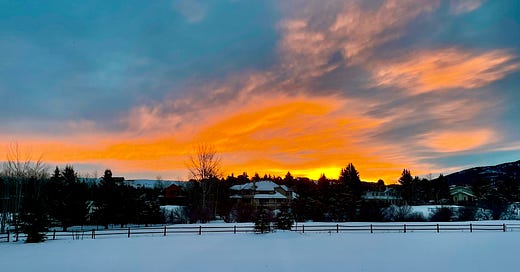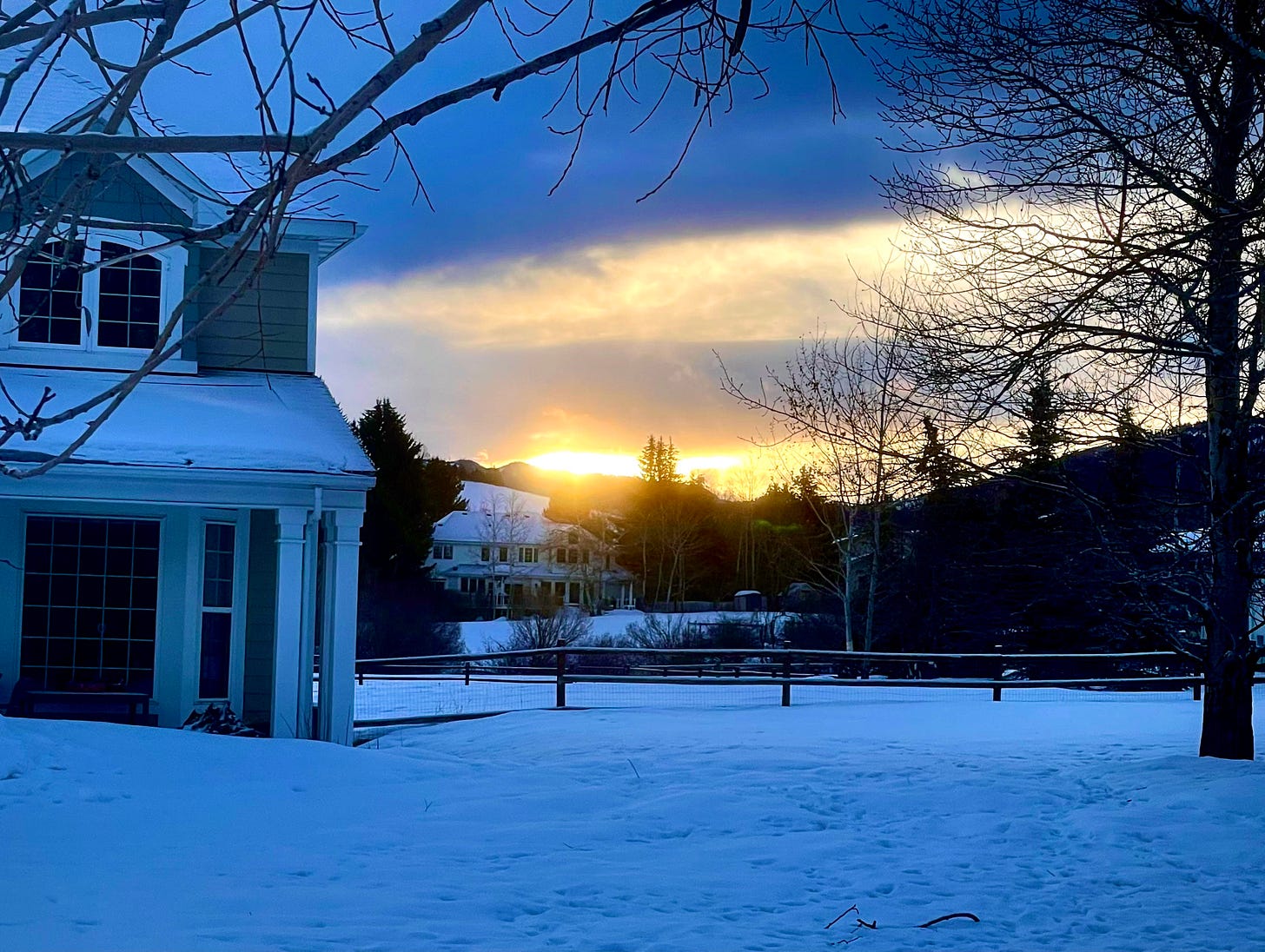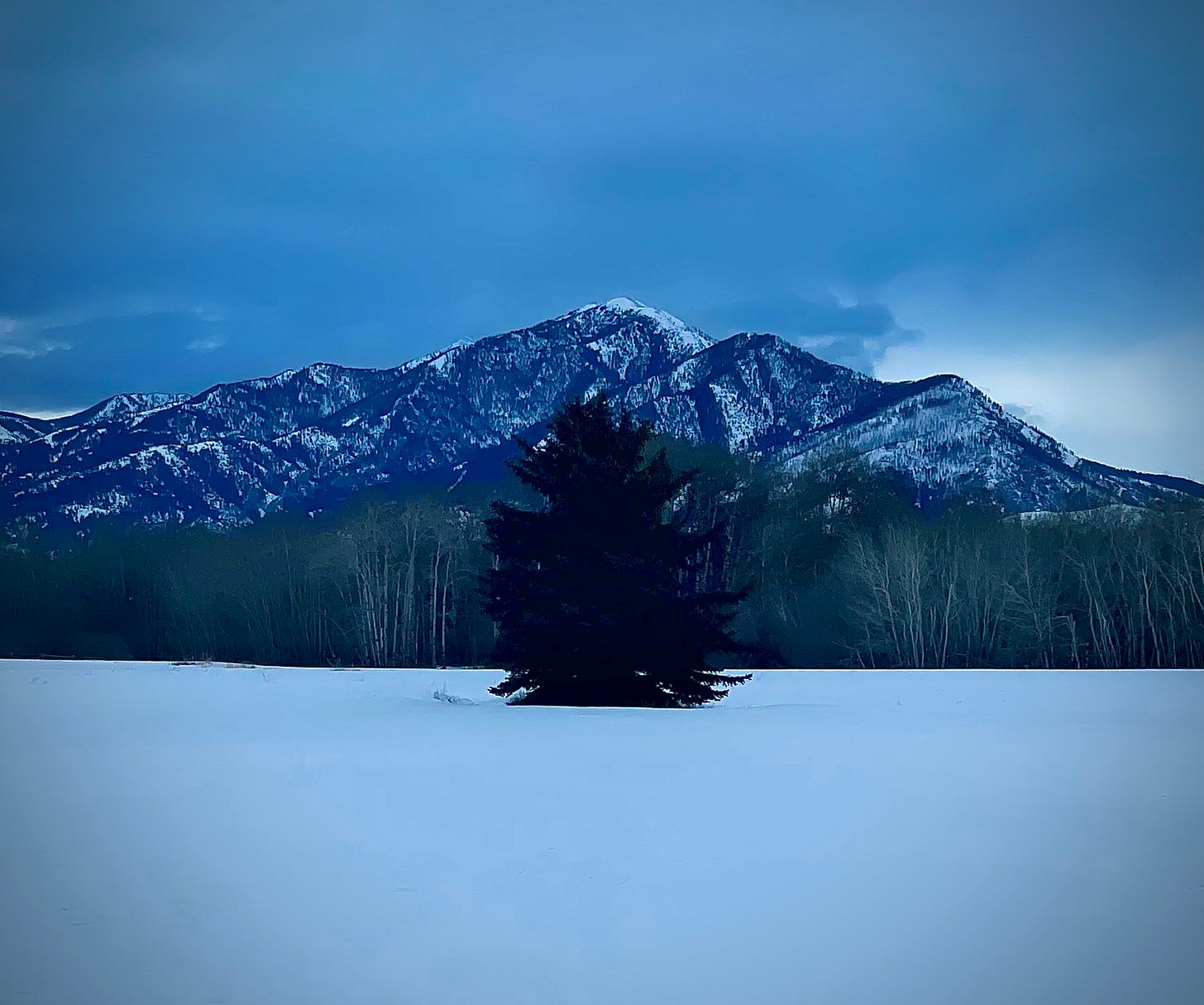Dear friend,
Inspired by
, I’ve been taking daily photographs. I’ve enjoyed trying to capture the sunrise cresting the mountains in a daily ritual of maintaining keen awareness of the perfect moment. The simple act of developing awareness, of both myself and the natural environment around me, has fueled me in difficult times. It’s a wellspring for developing the opportunity to cultivate wisdom. In what ways do you cultivate awareness for your own wisdom practice?Participating in our growth
Inspiration, the admixture of genius and motivation, is sometimes described as a force that strikes us after some patient lull or waiting period. This idleness is a mistake. The Muse arrives to us most readily during creation, not before. Homer and Hesiod invoke the Muses not while wondering what to compose, but as they begin to sing. If we are going to call upon inspiration to guide us through, we have to first begin the work. — Simon Sarris
We seem to have lost something in our pursuit of knowledge. I feel the loss of something I don’t always have words for.
I see people showing off how much they know as a badge of honor on Twitter and LinkedIn. They share knowledge like it’s been handed down on high. If you removed the computer screen and pocket-sized computer from their lives, they’d probably die. Maybe not literally die. Although thinking back on my time in SERE school, perhaps they would literally die.
That doesn’t seem like any ideal I aspire to. But as I said earlier, I didn’t have the right words to explain why. It wasn’t until I discovered John Vervaeke’s 4Ps of knowing that I had words for what I felt was missing. In this model, we come to know in 4 ways:
Propositional knowing: the knowing we were all taught in school. It’s how we know theories and philosophy. The last 200 years have been a steady process of emphasizing propositional knowledge over other forms.
Procedural knowing: knowing how to do something. When I learned to fly an airplane, I was developing procedural knowledge. As an aside, I suspect procedural knowledge is deeper than propositional. I don’t lose procedural knowledge the same way my propositional knowledge declines with time. I could still fly a plane, even though it’s been a few years.
Perspectival knowing: knowing through different perspectives with the ability to transition between them. In aviation terms, this is the situational awareness that I wrote about here. I also think of perspectival knowing as what leads to our “spidey sense” when we feel something is wrong, even though we can’t explain it.
Participatory knowing: knowing how to act within your worldview, or what John calls the “agent-arena relationship.” This is the knowing we experience when we enter flow. When we develop participatory knowing, our actions and the world seem to dance together as they mutually support each other.
Developing wisdom is not maximizing one type of knowledge at the expense of others. Instead, we develop wisdom by:
Advancing our skill in all four types of knowing.
Optimizing our skill in using each knowing in the right situation.
If it sounds like the proverbial “well-rounded” argument, it feels that way, but at a more meta-level.
Knowing about the four types of knowing isn’t enough to cultivate knowledge. Even thinking it should be is a sign of over-indexing on propositional knowing. Instead, we need practices to help us develop our skills. We must actively participate in the process of our development. It requires intentionality.
Two personal examples. The first example is the practice of awareness. I’m looking to expand my awareness through meditation and contemplation. I’m seeking teachers who can help me expand my practice by participating with me. The second example is this newsletter. I’m participating in the act of creating by writing and sharing my interests. I’m blessed that all of you join me.
This newsletter is a pure joyful act of creation that I use to develop wisdom in my world.
Every time I sit at my keyboard, I think of what feels worth creating and sharing. I wonder at what grabs my mind and channels itself through my fingers. And as I start writing, further inspiration comes through that learning. There is no end state that I can see. That’s why the Simon Sarris quote above speaks to me so deeply.
How do you participate in your development? What practice are you cultivating to improve your capacity for wisdom? If you’re comfortable sharing, I’d love to support you.
Thank you to
for sharing your article on ways of knowing that helped me understand more of what I was learning.A quote that’s stuck with me
“Write what you know” is not particularly interesting advice; “Write what you’re learning” is much better.
Photos this week
I’ve been posting these daily to Twitter. If you like them, please follow me to see them every morning.
A small experiment
If you’ve made it this far, thank you for your support. I’m going to run a small experiment in the Substack chat, and I’d love for you to join.
Every day for the next few weeks, I’ll share a thought or prayer about creating as an act of self-transcendence. These will be small thoughts, just large enough to keep creation front of mind. I’ll be participating in my own exploration by creating them for you and sharing them. It’s like a daily devotional but focused on participating in our own self-transcendence. I’d love to invite you to add to it.
If this resonates with you, please join me in the chat via the Substack reader app. You’ll notice the first thought today.
Until next week, have an intentionally curious week.
Latham
If you liked reading this, please click the ❤️ button on this post so more people can discover it on Substack 🙏. Also, please share it with anyone who is on a similar journey.








I’ve been enjoying the photos, keep ‘em coming!
Nice man. Never heard of this framework before. Excited to learn about it.